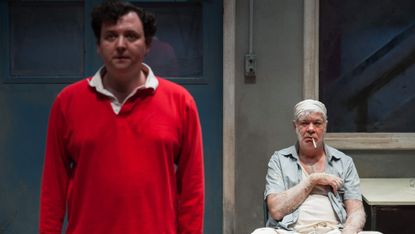Toast – reviews of 'vivid' Richard Bean revival
Compelling drama and gallows humour mix well in tale of bread factory workers

What you need to know
A revival of Richard Bean's Toast has opened at the Park Theatre, London. First performed in 1999, Toast was a breakthrough play for Bean, who went on to write West End hit One Man, Two Guvnors and, most recently, Great Britain.
The play, based on Bean's own experiences in a bread factory in Hull, tells the story of a group of factory workers, including ageing bread-mixer Walter and a mysterious student called Lance, who struggle to keep their spirits up while trying to save their jobs as management threatens to shut their decrepit operation down.
Subscribe to The Week
Escape your echo chamber. Get the facts behind the news, plus analysis from multiple perspectives.

Sign up for The Week's Free Newsletters
From our morning news briefing to a weekly Good News Newsletter, get the best of The Week delivered directly to your inbox.
From our morning news briefing to a weekly Good News Newsletter, get the best of The Week delivered directly to your inbox.
Eleanor Rhode directs a cast including Matthew Kelly as Walter and John Wark as Lance. Runs until 21 September.
What the critics like
This "excellent and highly welcome revival" has plenty of humour and moments of deeper feeling, says Charles Spencer in the Daily Telegraph. The superb Kelly is mesmerising, but all the performances are vivid, and the play's mixture of robust humour and sudden moments of tense drama proves constantly compelling.
Toast is "a small and vivid piece, packed with Bean's now familiar gallows humour", says Henry Hitchings in the Evening Standard. Performed with appealing simplicity, it feels like an ode to ordinariness.
Bean has gone on to write bigger plays, but "he has written few better than this", says The Guardian. Rhode's production evokes the idea of factory work as both a curse and a blessing and all the characters are vividly particularised.
What they don't like
Critics have almost no criticisms of the play. On the Arts Desk Caroline Crampton notes that it's hard to know or understand what the character Lance is or what he wants, but "the play deliberately avoids inquiring too deeply" because, as long as you've got work and some mates to do it with, you're doing alright.
Create an account with the same email registered to your subscription to unlock access.
Sign up for Today's Best Articles in your inbox
A free daily email with the biggest news stories of the day – and the best features from TheWeek.com
-
 'Elevating Earth Day into a national holiday is not radical — it's practical'
'Elevating Earth Day into a national holiday is not radical — it's practical'Instant Opinion Opinion, comment and editorials of the day
By Harold Maass, The Week US Published
-
 UAW scores historic win in South at VW plant
UAW scores historic win in South at VW plantSpeed Read Volkswagen workers in Tennessee have voted to join the United Auto Workers union
By Peter Weber, The Week US Published
-
 Today's political cartoons - April 22, 2024
Today's political cartoons - April 22, 2024Cartoons Monday's cartoons - dystopian laughs, WNBA salaries, and more
By The Week US Published
-
 The Westbury Hotel review: stunning suites in charming Dublin
The Westbury Hotel review: stunning suites in charming DublinThe Week Recommends This hotel is the perfect spot to while away a weekend in Ireland's capital
By Kaye O'Doherty Published
-
 Drama movies 2024: new films out this year
Drama movies 2024: new films out this yearIn Depth Latest reviews include The Boys in the Boat, One Life and Tchaikovsky's Wife
By The Week UK Last updated
-
 Best new hotels and places to stay in 2024
Best new hotels and places to stay in 2024The Week Recommends Featuring stylish island resorts, historical properties and wilderness retreats
By The Week UK Last updated
-
 Albums of the year: best music of 2023
Albums of the year: best music of 2023The Week Recommends A look back at the best pop, rap, jazz, dance, classical and rock releases
By The Week UK Published
-
 Savoy Grill by Gordon Ramsay review: an institution reinvented
Savoy Grill by Gordon Ramsay review: an institution reinventedThe Week Recommends Traditions are maintained and the tweaks are clever and modern
By Neil Davey Published
-
 Tulum: a Mexican beach town of 'two halves'
Tulum: a Mexican beach town of 'two halves'The Week Recommends With the 'pueblo' and 'Zona Hotelera', Tulum is home to great hotels, restaurants and beach clubs
By William Leigh Published
-
 La Zebra review: beach chic, perfect tacos and secret cenotes
La Zebra review: beach chic, perfect tacos and secret cenotesThe Week Recommends Enjoy a stylish stay in Mexico at this family-friendly beach hotel and restaurant
By William Leigh Published
-
 Atlantis Paradise Island Bahamas review: a mythical beachside resort
Atlantis Paradise Island Bahamas review: a mythical beachside resortThe Week Recommends Combine the classically simple pleasures of sun, sea and sand with upmarket fun and food
By Adrienne Wyper Published